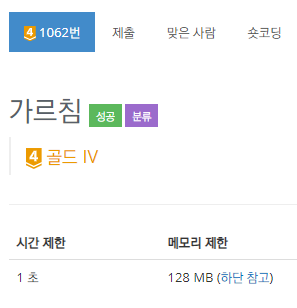문제

문제접근
문제 이해
-
저번에 배웠던 교훈에 따라 효율성 신경쓰지말고 먼저 정답을 만들기에 집중했습니다.
(AC는 받았지만 속도 느리다는 점 미리 밑밥 깔고 갑니다...ㅎㅎ) -
문제를 요약하면, ''단어 N개 중 알파벳 K개로 표현할 수 있는 단어의 최대 개수를 구하세요'' 입니다.
-
문제 과정을 요약하면 다음과 같습니다.
- 26개 알파벳 중 K개를 중복없이 고릅니다. (조합)
- 단어 N개를 순회하며
- 해당 단어 속 단어들이 K개 알파벳에 포함되는지 검사합니다.
-
'최대 개수'를 알기 위해서는 모든 조합을 검사해야 하므로 bruteforce 문제입니다.
- 따라서 위 과정의 1번과 2번에서 경우의 수를 줄일 수 없습니다.
- 하지만, 과연 그럴까요?
-
Bruteforce이므로 탐색해야하는 범위 자체를 줄일 수는 없지만, 조금 효율적으로 조합을 구할 수 있는 방법이 있습니다.
-
바로, "남극언어의 모든 단어는 "anta"로 시작되고, "tica"로 끝난다"라는 조건 덕분입니다.
-
단어를 최대한 읽기 위해서는 무조건
a, c, i, n, t5글자를 알아야 합니다.- 따라서, 입력
K가5보다 작다면 무조건 읽을 수 있는 단어 개수는0입니다. - 따라서, 알파벳
a, c, i, n, t는true로 놓고 출발합니다. - 따라서, 26개 중 K개 알파벳을 뽑는 문제는, 21개 중 K-5개 알파벳을 뽑는 문제로 바뀝니다.
- 고려할 조합의 개수가 줄어듭니다.
()
- 따라서, 입력
-
저는
alphabet[26]과perm[26]이라는bool타입 배열 2개를 만들었습니다.alphabet[26]:a, c, i, n, t5글자를 항상true로 가지고 있는 배열입니다.perm[26]: 고른 K-5개의 알파벳을false로 가지고 있는 배열입니다.- 21개 중 K-5개 알파벳을 고르는 과정을 코드로 구현하기 까다롭습니다.
따라서, 만일perm[]에 저장된K-5개의 알파벳이alphabet과 겹치는 경우는continue;로 생략하도록 만들었습니다.
-
각 단어를 검사할 때 단어 길이가 짧기 때문에
for문을 이용해서 검사했습니다.
하지만, 비트마스크를 이용하는 방법도 있습니다.- string 타입의 vector가 아니라 int형 vector를 만듭니다.
- 단어를 입력받을 때,
i번째 단어에 포함된 글자에 해당하는 비트를 set 해줍니다. - 검사할 때 해당 비트가 set인지 reset인지 검사하면 됩니다.
코드
#include <iostream>
#include <vector>
#include <algorithm>
#define NUMALPHA 26
#pragma GCC optimize("O3")
#pragma GCC optimize("Ofast")
#pragma GCC optimize("unroll-loops")
using namespace std;
int main() {
ios::sync_with_stdio(false), cin.tie(NULL);
int N, K, ans = 0;
cin >> N >> K;
vector<string> words(N);
for (int i = 0; i < N; ++i) cin >> words[i];
if (K < 5) { cout << ans; return 0; }
vector<bool> alphabet(NUMALPHA, false);
alphabet[0] = alphabet[2] = alphabet[8] = alphabet[13] = alphabet[19] = true;
vector<bool> perm(NUMALPHA, true);
for (int i = 0; i < K - 5; ++i) perm[i] = false;
do {
int cnt = 0;
if (!perm[0] || !perm[2] || !perm[8] || !perm[13] || !perm[19]) continue;
for (int i = 0; i < NUMALPHA; ++i) // check readable alphabets.
if (!perm[i]) alphabet[i] = true;
for (const string& word : words) {
bool flag = true;
for (size_t i = 0; i < word.length(); ++i) // Is the word readable?
if (!alphabet[word[i] - 'a']) { flag = false; break; }
if (flag) cnt++;
}
for (int i = 0; i < NUMALPHA; ++i) // uncheck alphabets for next loop.
if (!perm[i]) alphabet[i] = false;
ans = max(ans, cnt);
} while (next_permutation(begin(perm), end(perm)));
cout << ans;
}결과

